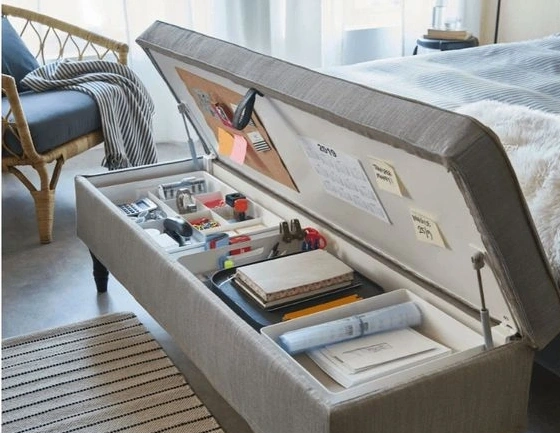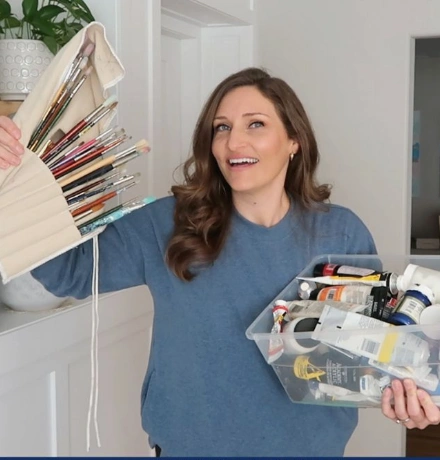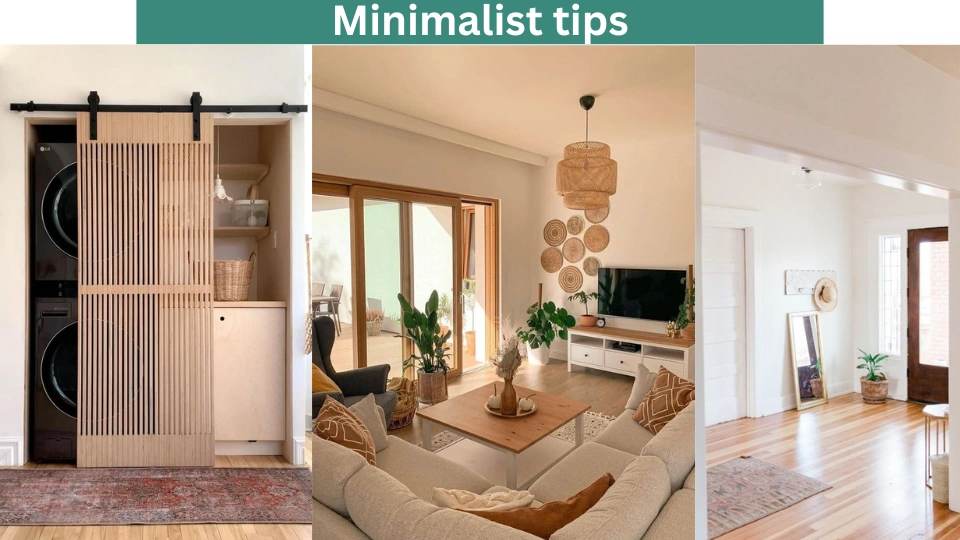Minimalist tips can make a big difference in managing our busy lives. Dishes and unread emails are only two examples of the physical and emotional clutter that may build up as one juggles work and personal responsibilities.

Adopting a minimalist lifestyle allows us to separate ourselves from the noise and concentrate on what’s important. It’s not about getting rid of everything; instead, it’s about carefully choosing what to keep and letting go of what we don’t need.
Our mental clarity, stress levels, and general health can all be improved by clearing our spaces of unnecessary items and focusing on what’s truly important. Let’s dive into some minimalist tips for beginners, practical tips, and decluttering to simplify our lives and find more peace and balance.
What Is Minimalism?
Minimalism is a lifestyle philosophy aimed at simplifying physical possessions and mental clutter. Those who embrace minimalism strive to own fewer material items, finding purpose and value in their possessions. This lifestyle often involves living in compact spaces to minimize upkeep and maximize efficiency.
Financial management is critical, with minimalists focusing on budgeting to invest in experiences rather than accumulating possessions. Digital minimalism is also practiced, with individuals reducing distractions to prioritize meaningful activities.
Sustainability is central, with a commitment to reusable products and eco-friendly habits. Organizational routines are established to enhance productivity and prevent overwhelm. Overall, minimalism promotes a deliberate and mindful approach to living.
Benefits Of Minimalism
Transitioning to a minimalist lifestyle may seem daunting, but its benefits make it worthwhile. Here are five advantages to consider:
1: Reduced stress through decluttering: Studies show that clutter can increase stress levels by triggering the release of cortisol, the stress hormone. Maintaining a clean and organized space promotes better physical and mental well-being.
2: Improved efficiency and collaboration: Streamlining your environment eliminates time wasted searching for misplaced items, allowing you to be punctual and dependable. A clutter-free workspace fosters better cooperation and professionalism, enhancing relationships and reputation.
3: Enhanced productivity and focus: Research suggests that a cluttered environment taxes the brain’s processing power, leading to decreased productivity and mental fatigue. Simplifying your surroundings minimizes distractions and boosts concentration, leading to improved performance.
4: Greater life satisfaction: Minimalism prioritizes experiences and relationships over material possessions. Minimalists often report higher overall happiness and life satisfaction by focusing on what truly matters, such as gratitude and contentment.
5: Improved financial management: Embracing minimalism involves mindful spending and decluttering unnecessary purchases. This approach frees up resources toward savings or investments, contributing to long-term economic stability and wellness.
Top Minimalist Tips

Becoming a minimalist does not have to be a quick process. It is preferable to take it slowly, as this will allow you to self-reflect and deliberate on the habits and things you choose to eliminate. Here are minimalist practical tips to live a simpler and more efficient life:
1: Figure Out Your Goals
Understanding what matters most to you is essential for a calmer and clearer life. Consider your goals by writing them down or spending a few minutes reflecting.
You can strengthen relationships, save money, or become more organized. Setting goals and figuring out what’s most important to you will help you make a plan.
2: Appreciate What You Have
Feeling inadequate is a common reaction to unfavorable comments on social media or from people in general. Keep your mind on the positive aspects of your own life, though.
Write down one item you’re grateful for every morning. It might be anything from enjoying your job to spending time with loved ones. Expressing appreciation for what you have can improve your attitude and bring your focus back to what matters.
3: Every Day, Declutter
When you are through with anything, put it away. Keep things from lying around that you don’t need. Consider incorporating decluttering into your regular practice to ensure you begin each day in an organized state. When you do this, calm and order will wash over you.
4: Take Baby Steps
Starting anew or attempting to improve your behaviours might feel like a huge undertaking. Make incremental changes daily or weekly rather than trying to tackle everything at once.
Rejoice in the small wins; they will motivate you. If you want your office to be more organized, clean your desk one week and sort your bookcases the following. With time, these little actions build-up.
5: Organize Your Space
Neatly organize your space after removing the items you do not require. Use filing systems, transparent storage containers transparent, and specific locations for each item. In this manner, you can avoid clutter and reliably locate the items you seek.
6: Go Digital With Documents
Do you know that American businesses waste $8 billion each year managing paper, even though we have technology? Instead of drowning in paper clutter, store important documents electronically. This saves time hunting for papers and makes sharing information easier. Plus, it keeps your records safe and frees up space.
7: Build Your Mini-Wear
Following the latest trends can waste money and space in your closet. A more practical alternative is to assemble a capsule wardrobe consisting of several adaptable pieces.
Rather than trying to buy into every fad, prioritize products that complement your style and serve a practical purpose. Less time spent in the mornings trying on clothes is another benefit of having fewer clothing items.
8: Choose Multipurpose Items
Choose multipurpose items to cut down on clutter. By consolidating printing, scanning, and copying into one device, all-in-one printers, for instance, make better use of available space.
By allowing you to connect numerous devices to a single hub, universal docking stations help you to organize your desk. In addition, teams can operate more efficiently using collaboration solutions that consolidate messaging, file sharing, and project management.
9: Fix Broken Items
Instead of throwing away broken things and buying new ones, try repairing them. This not only saves you money but also reduces waste.
Take a look around your home and office for items that need fixing. Repairing your belongings is sustainable and helps you develop skills like resourcefulness and problem-solving.
10: Use Apps To Organize Things.
Using to-do lists, calendars, and apps that organize chores can help you stay on top of your responsibilities. With the help of these tools, you will be able to manage your daily routine, thereby decreasing mental clutter more effectively.
You can concentrate more intently on your work and ensure you remember all commitments if you maintain organization.
11: Invest In Experiences
Minimalism isn’t just about saving money. It’s about spending wisely. Instead of focusing on buying stuff, invest in experiences.
Engaging in hobbies or spending time with loved ones can create meaningful memories and deepen connections. By prioritizing experiences over material possessions, you can lead a more fulfilling life.
12: Monitor Your Screen Time
Engaging in excessive usage of a computer or phone might cause mental congestion. If you want to reduce your time looking at screens, use apps that help you focus, put your phone in quiet mode, or turn off notifications.
Taking a break from digital devices can help you get better sleep, maintain a healthy balance between your personal and professional lives, and give you the mental clarity you need to concentrate on what brings you joy.
13: Engage In Mindful Practices
Try to practice mindfulness by engaging in activities such as self-reflection and thankfulness rather than giving in to impulsive purchases that only provide momentary satisfaction. Because of these activities, you will better understand your values, enabling you to prioritize how you spend your time and money more prudently.
14: Put Quality First Rather Than Quantity
Although the initial cost of quality products may be higher, it is frequently the case that these products end up being more cost-effective in the long run.
The need for frequent replacements or repairs is typically reduced when quality things are purchased because they tend to perform better and last longer. Whether shopping for a new computer, office chair, or clothing, you should prioritize quality over quantity.
15: Achieve Self-Control Through Positive Routines
Redirecting that energy into healthier behaviours is better than turning to impulse purchases as a short remedy for stress or overwhelm. Try deep breathing techniques, meditation, or yoga if you’re having trouble refocusing and finding peace when things get tough.
16: Hold Firm To The “One In, One Out” Principle
Many minimalists adhere to the “one in, one out” guideline to prevent impulsive purchases. It would help if you made it a habit to either give away or get rid of something you already own whenever you bring in a new item.
Consider donating a sweater you don’t wear very often, for instance, if you acquire a new sweater for the fall season. Utilizing this strategy allows you to avoid making purchases that are not necessary and maintains a clutter-free living area.
17: Inspire People To Share Within Their Communities
It is optional to possess everything, particularly things that you use sparingly. Consider borrowing books from the library, exchanging tools with acquaintances, or sharing software licenses with associates.
This saves waste and reduces the number of optional duplicates. Sharing also encourages generosity, helps deepen connections, and contributes to developing a sense of community.
18: Arrange For Sessions To Eliminate Clutter
By setting it on your calendar, you may declutter a regular part of your daily routine. Making it a part of your routine, whether once every two months or once a year, will help you develop the habit of cleaning and organizing your space.
You also let other people know when you want to declutter, which allows them to assist you if they so desire.
19: Create A Budget
Develop a personalized budget that categorizes your expenses into fixed, variable, and discretionary categories.
This helps you understand where your money is going and prevents unnecessary spending. Setting clear financial guidelines will align you more with your financial goals.
20: Donate Items You No Longer Need
Consider donating items to community centres or organizations when tidying up your freezer, closet, or office. Things you no longer use might be valuable to someone else. The joy of helping others can motivate you to declutter your space.
21: Redirect Unnecessary Spending
If you’re looking to save up for retirement or spend that extra cash toward new clothes or a better phone, think about doing the latter instead. It can be simpler to control spending and stay on track with your financial objectives if you can see your savings grow.
22: Budget Efficiently
It’s a good idea to keep track of everything you buy to get a handle on your spending patterns. Keeping a record of your spending prompts introspection and raises awareness.
Find any subscriptions or services (such as a gym membership, a streaming service, or a newsletter) that you no longer use and cancel them by reviewing your monthly bank statements. This way, you can be sure that your money is going toward worthwhile endeavours.
23: Maintain Tabs On Your Progress
Write down everything you do in a journal to record your journey toward minimalism. Organizing your home and improving your spending habits will positively impact your life. Write about it.
Maintaining motivation and pride in your self-improvement efforts can be achieved through reflective thinking on your progress
24: Find Motivation And Encouragement
Read books, listen to podcasts, and watch TED Talks if you need inspiration to live a minimalist lifestyle. The knowledge and insight of others and their experiences may be a great source of inspiration and direction. View “Tidying Up” by Marie Kondo on Netflix or read “The More of Less” by Joshua Becker if you want practical advice on simplifying your life.
MINIMALIST TIPS FOR HOME DECOR
- Eliminate the clutter.
- It is important to incorporate accessories in a planned manner.
- Select pieces of furniture that have clean lines.
- Keep to a color scheme that is neutral.
- Bring the natural world within.
- Recognize the fact that the process of keeping a minimalist house is an ongoing one.
Make Things Easier
Live a simpler life by committing to a minimalist lifestyle. A minimalist lifestyle can help you achieve your goals, whether cleaning up your living space or reevaluating your spending habits. As you set off on this adventure, be easy on yourself.
Time, patience, and a growth mindset are necessary for letting go of material goods and developing new behaviours. You may make your life easier and more conducive to focusing on what’s important by making minimalism, mindfulness, and clearing clutter your top priorities.

